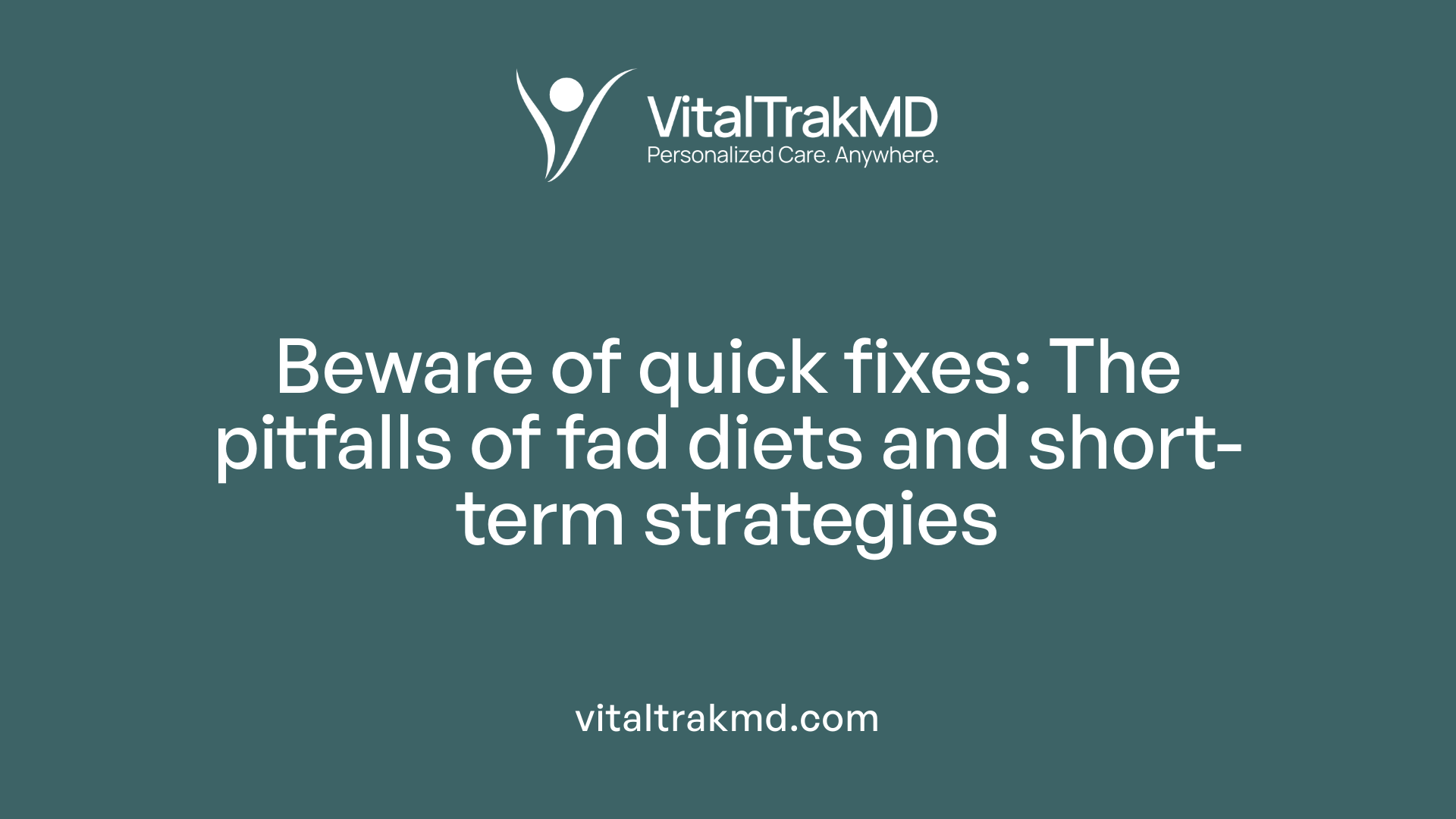Why Weight Loss Plans Fail Without Ongoing Support

Understanding the Complexity of Weight Management
Many individuals embark on weight loss journeys with enthusiasm, only to find themselves facing recurring setbacks and weight regain. The reason? Sustainable weight management is embedded in behavioral change, psychological resilience, and physiological adaptation. Without ongoing support and a holistic approach, even well-intentioned diets often fall short of producing long-term results. This article explores why weight loss plans tend to fail without consistent support, delving into psychological, behavioral, and biological factors, and highlighting strategies for lasting success.
The Importance of Continuous Motivation and Support
Why do diets tend to fail without ongoing support?
Research shows that most diet plans, especially those focused solely on short-term restriction, often fail because individuals lack continuous guidance and accountability. Maintaining healthy lifestyle changes over the long term requires sustained effort, behavioral adjustments, and emotional resilience. Without professional support, many people struggle to adapt their habits, manage setbacks, and stay motivated.
The body’s biological response to calorie restrictions can hinder progress. When calorie intake drops significantly, the body reacts by slowing metabolism, increasing hunger through elevated levels of hunger hormones like ghrelin, and decreasing satiety signals such as leptin. These changes make it more challenging to stick with dietary changes. Moreover, emotional and behavioral challenges—such as stress, boredom, or emotional eating—are difficult to navigate alone.
Supporting individuals through ongoing guidance helps address these physiological and psychological barriers. Regular check-ins with health professionals help modify plans as needed, while behavioral coaching fosters healthier mindsets around food. Community support, group activities, and accountability partnerships further reinforce motivation and adherence.
Long-term success in weight management is rooted in the development of sustainable habits—like balanced eating, physical activity, and stress coping strategies—not just pursuit of temporary dieting goals. Studies indicate that consistent professional support increases the likelihood of maintaining weight loss by helping individuals navigate setbacks and reinforcing positive behaviors.
In conclusion, the dependence of lasting weight loss on continuous motivation highlights the importance of ongoing support systems. These systems provide essential motivation, help to normalize setbacks, and ensure that behavioral changes are integrated into everyday life, making weight management achievable and sustainable.
Psychological, Behavioral, and Physiological Contributors to Diet Failure

What psychological, behavioral, and physiological factors contribute to diet failure?
Maintaining a healthy diet is often hampered by a combination of psychological, behavioral, and physiological challenges. Psychologically, many individuals struggle with low motivation, poor self-efficacy, and dissatisfaction with body image. These mental barriers can lead to feelings of hopelessness or frustration when initial weight loss efforts do not meet expectations. Emotional dysregulation and stress are additional factors that can trigger emotional eating, where food becomes a coping mechanism, further sabotaging long-term success.
Behavioral challenges are equally significant. Practices such as extreme restriction and disinhibition—losing control around certain foods—can lead to binge episodes or cycle dieting, commonly known as yo-yo dieting. These behaviors often stem from rigid dietary rules that are impossible to sustain, contributing to feelings of deprivation, cravings, and ultimately, relapse. Emotional eating, triggered by boredom, sadness, or anxiety, complicates dietary adherence and often results in overeating.
Physiologically, the body’s responses to caloric restriction present formidable barriers to long-term weight management. Notable changes include hormonal adaptations such as decreased leptin and peptide YY levels and increased ghrelin levels, all of which promote hunger and cravings. Moreover, metabolic slowdown through adaptive thermogenesis reduces resting calorie burn, making weight loss more difficult and increasing the likelihood of regain. These physiological responses are natural survival mechanisms, designed to conserve energy during periods of scarcity, but they work against sustained weight loss.
The complex interplay of these factors also raises concerns about disordered eating patterns, which may develop from psychological vulnerabilities. These patterns can range from emotional eating to clinical eating disorders, which pose serious health risks. External influences, including societal beauty standards, weight stigma, and traumatic experiences, further elevate the risk of both short-term failure and chronic disordered eating.
Overall, overcoming long-term dietary challenges requires addressing these psychological barriers, behavioral patterns, and physiological responses through comprehensive, supportive, and personalized strategies. Recognizing how these factors interconnect can inform more effective interventions that support sustainable health and weight management.
Why Lifestyle Changes Must Be Sustainable for Long-Term Success

How does developing automatic healthy habits support long-term weight control?
Building automatic habits is fundamental for maintaining weight loss over time. When healthy behaviors, like choosing nutrient-dense foods and engaging in regular exercise, become ingrained routines, they require less conscious effort, making them easier to sustain. Once these habits are automatic, individuals are less likely to revert to previous unhealthy patterns, which often lead to weight regain. This process involves consistent practice, positive reinforcement, and gradual behavioral changes that align with long-term health goals.
What is the role of a balanced diet and physical activity?
A balanced diet rich in fruits, vegetables, lean proteins, and whole grains provides essential nutrients that support overall wellness and help stabilize weight. Coupled with consistent physical activity, such as walking, resistance training, or other enjoyable exercises, these components foster a healthy metabolism and improve body composition. Such an approach emphasizes moderation and variety, which are crucial for sustainability. Unlike fad diets, which are restrictive and often short-lived, balanced eating and regular activity promote enduring habits that prevent weight cycling.
How does stress management and emotional well-being influence sustainable weight management?
Managing stress and emotional health is vital because psychological factors deeply impact eating behaviors. High stress levels and negative emotions can trigger overeating or comfort eating, undermining weight management efforts. Techniques like mindfulness, adequate sleep, relaxation exercises, and seeking support from mental health professionals help reduce emotional triggers. Emphasizing emotional well-being supports a positive relationship with food, decreases the likelihood of bingeing, and encourages long-term commitment to healthy lifestyle changes.
| Aspect | Impact on Long-Term Success | Practical Strategies |
|---|---|---|
| Automatic habits | Reduce effort needed to maintain health behaviors | Consistency, cues, reward systems |
| Balanced diet & activity | Supports metabolic health and satiety | Nutrient-dense foods, enjoyable movements |
| Stress & emotional health | Prevents emotional eating and burnout | Mindfulness, sleep, emotional support |
Why is sustained lifestyle change crucial?
Long-term weight management relies on adopting a lifestyle that is realistic and adaptable rather than focusing on temporary fixes. It promotes the development of habits that become second nature, making weight control easier and more intuitive. This approach also considers overall well-being, including sleep, stress, and emotional health, addressing the underlying factors that influence eating behaviors. Such a holistic, sustainable strategy significantly improves quality of life and reduces the chances of weight regain, reinforcing the importance of patience, consistency, and personalized support on the journey to lasting health.
Common Challenges and Pitfalls in Dieting
What are common pitfalls and challenges in dieting and weight loss efforts?
Many individuals attempting to lose weight encounter a series of hurdles that can undermine their success. A primary obstacle is the body's biological response to calorie reduction. When calories are restricted, the body reacts by slowing down metabolism — a process known as metabolic adaptation — which conserves energy and can make further weight loss difficult.
Hormonal shifts also play a significant role. Post-weight loss, levels of hormones like leptin and peptide YY decrease, while hunger-stimulating hormones such as ghrelin increase. These changes tend to increase appetite and carbohydrate cravings, often leading to weight regain. This biological feedback loop persists for at least a year after initial weight loss.
Psychological barriers are equally challenging. Emotional triggers like stress, boredom, or sadness can lead to overeating, especially if diets are overly restrictive and do not address emotional health. Societal influences, such as negative body image, weight stigma, and a food environment rich in hyperpalatable, high-calorie foods, further complicate efforts.
Unrealistic expectations and quick-fix dieting methods frequently lead to frustration. Many diets promise rapid results but are often unsustainable and too restrictive, causing feelings of deprivation. When dieters violate these strict regimes, they may succumb to the 'what the hell effect'—binge eating or reverting to old habits—ultimately leading to a cycle of weight loss and regain.
Additionally, poor diet choices, like consuming sugary beverages or skipping meals, can promote overeating later due to increased hunger and decreased satiety. Lack of professional guidance or support can leave dieters unprepared for these challenges, heightening the risk of nutritional deficiencies, health issues, or disordered eating.
Addressing these challenges requires a sustainable, supportive, and personalized approach. Emphasizing balanced nutrition, gradual behavioral modifications, realistic goal setting, and ongoing professional support increases the likelihood of long-term success.
The Role of Professional Guidance and Medical Support
How does professional guidance improve weight loss success?
Professional support plays a vital role in achieving and maintaining weight loss over the long term. When individuals work with healthcare professionals or registered dietitians, they receive tailored advice that considers their unique health conditions, metabolic characteristics, and lifestyle factors. This personalized approach increases the chances of sticking to a sustainable plan.
Ongoing monitoring by experts helps identify potential issues early, whether they are hormonal imbalances, nutritional deficiencies, or behavioral challenges. Such supervision ensures that the weight management strategy remains effective and safe. Professionals also provide motivation and accountability, which are often missing in self-directed dieting.
Medically supervised programs can include interventions like hormonal therapies, FDA-approved medications, or non-invasive fat reduction treatments. These options are grounded in scientific research and help address underlying health conditions that hinder weight loss. For example, addressing hormonal imbalances or metabolic slowdown can significantly improve results.
A comprehensive, supported environment reduces the frustration and discouragement that often lead to diet relapse. It encourages long-term behavior changes, such as adopting healthier eating habits and integrating physical activity. Overall, professional guidance fosters a structured, evidence-based pathway to sustainable weight management, significantly improving outcomes.
Shortcomings of Fad Diets and Short-Term Strategies

What are the shortcomings of fad diets and short-term approaches?
Fad diets and quick-fix strategies are often appealing because they promise rapid weight loss with minimal effort. However, they tend to be highly restrictive, cutting out entire food groups or severely limiting calorie intake. This approach can lead to nutritional deficiencies, muscle loss, and other health issues like dehydration and hormonal imbalances.
The rigid nature of these diets makes them difficult to maintain over time. Many individuals find themselves experiencing intense cravings or binge episodes, which often result in weight rebound once the diet is discontinued. This cycle, known as yoyo dieting, ultimately hampers long-term weight management.
Additionally, fad diets frequently rely on unsupported claims and unproven scientific evidence. They often promote unbalanced or unscientific methods that lack a comprehensive understanding of human physiology. Consequently, they can spread misinformation about what constitutes healthy eating.
Health risks are another concern. Restrictive diets may cause fatigue, weakness, and nutritional gaps, negatively affecting overall well-being. Furthermore, these diets can trigger psychological distress, leading to frustration, hopelessness, and disordered eating behaviors.
A sustainable and safe approach involves personalized nutrition plans and ongoing support from healthcare professionals, like dietitians. Such strategies promote balanced eating, regular physical activity, and lifestyle changes that are maintainable in the long run. Moving away from fad dieting towards evidence-based, holistic methods enhances chances for lasting weight management and better health outcomes.
Achieving and Maintaining Long-Term Weight Success
Sustainable weight loss is a multifaceted journey that demands ongoing support, psychological resilience, physiological understanding, and behavioral adaptations. Short-term diets and quick-fix solutions rarely result in lasting change due to biological and emotional feedback mechanisms that trigger weight regain. Embracing gradual lifestyle changes, seeking professional guidance, and fostering intrinsic motivation are essential for overcoming the complex barriers to weight management. A comprehensive, personalized, and holistic approach not only enhances the likelihood of success but also enriches overall well-being and quality of life. True and lasting weight management is attainable when individuals commit to ongoing support and continuous self-awareness, transforming dieting from a temporary task into a lifelong commitment to health.
References
- Why it is so hard to lose weight? An exploration of patients' and ...
- The Science Behind Why Dieting Doesn't Work | Omada Health
- Why diets often don't lead to long-term weight loss
- Most Diets Fail. Here's Why: - Better Health Management
- Why Do Most Diets Fail and How Weight Management Programs ...
- 5 Reasons Most People Fail to Achieve Lasting Weight Loss
- Why Do Most Diets Fail in the Long Run? | Psychology Today
Recent articles
Want to Feel Better and Live Healthier?
Join hundreds of patients taking control of their health with personalized care that fits their life – not the other way around.
Rated 4.8/5 by 32+ customers







